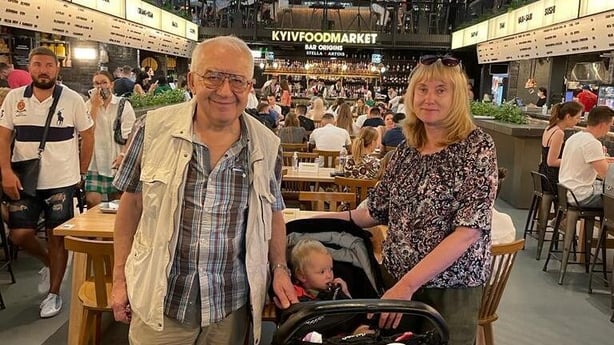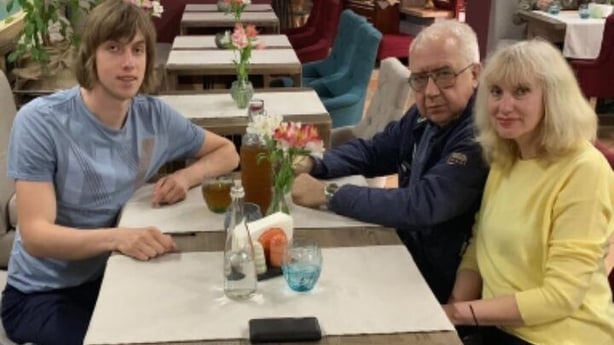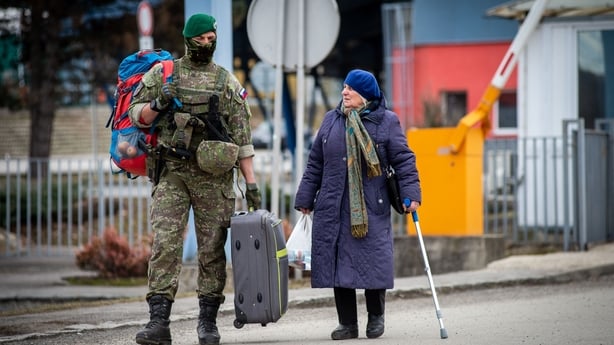Ukraine native Anton Krasun's alarm went off early in his apartment in Dublin's IFSC last Thursday, to wake him for a morning conference call.
But the 32-year-old, who works for one of the major US tech companies based in the Irish capital, never dialled into that meeting.
As he rubbed the sleep from his eyes, he saw his phone screen was filled with messages from family and friends and news notifications alerting him about the Russian invasion of his homeland.
Instead of going to work, he spent the day trying to assist from thousands of miles away, as his parents packed their belongings and fled to the Polish border.
The first that his parents, 62-year-old Alla and 73-year-old Sasha, heard of the Russian invasion was an early morning call from family in the US.
As the callers from Denver, Colorado relayed the news from US TV networks that Russia had invaded their country, confirmation came a few minutes later when they heard the sound of superjets flying overhead.
They went to their balcony and looked out over the forest beside their home, which is outside Lviv in Western Ukraine.
In the distance, they could see the bombardment of the airfield that lies 30km from their home.
When they phoned Anton in Dublin to tell him what was happening, he urged them to leave.

As he frantically called family and friends back home to arrange transport, his parents packed a bag and left the family home, not knowing if and when they would return.
They made most of the journey by car, but as the border crossing they were aiming for was congested by tailbacks of traffic and lines of abandoned vehicles, they decided they would complete the final leg of the journey on foot.
The couple found themselves walking through fields, but as his father suffers with a hip problem, Anton describes how his mother had to pull his father along for some of the journey. At one stage, he fell and injured his leg, but they continued the journey.
Anton said he was scared, angry and shocked at what his parents had to endure.
We need your consent to load this rte-player contentWe use rte-player to manage extra content that can set cookies on your device and collect data about your activity. Please review their details and accept them to load the content.Manage Preferences
"Once they reached the border it was night, so it was just a kind of madness. Thousands of people; like dogs, cats, families, children. It was going very slow," he said.
"In total this whole journey took them 23 hours to cross the border. There was no place to eat, to drink, to go to the toilet. I have no words. It's surreal. It's just hard to imagine.
"My parents at this age, they don't want to come anywhere, they're happy where they are and now they have to leave their homes and look for a better place. You just cannot process this, you know, that they're like refugees, in the middle of Europe."
But after 23 hours, they finally crossed the border into Poland. From there they took another five-hour journey by car to Warsaw, where they are resting in a hotel before they fly to Ireland tomorrow and from there, via video and their son's translation, they tell RTÉ News about their journey.
"My Dad, he's feeling very sorry about leaving this country, he's devastated, but he realises that this situation is very dangerous," Anton said.

For his mother, she is still trying to process the scenes that she witnessed of families being separated at the border.
"Young men are trying to help their wives and their kids through the border, because they couldn't leave Ukraine because there is a martial law and if you're under 60 you cannot leave Ukraine at the moment," he explained.
"So, the scenes were horrific, seeing those families being separated and not being sure what will happen next and when is the next time they will see each other."
After Ireland yesterday lifted the requirement for Ukrainians to have a visa to travel here, Anton booked his parents on a flight from the Polish city of Poznan, which arrives in Dublin tomorrow night.
His mother, he said, is happy to be able to be reunited with Anton, his Ukrainian wife Inga and their 19-month-old daughter Erin, but he said his parents are still trying to come to terms with what they have left behind.
"My mom has two sisters and they both have to stay, so they have no opportunity to leave," Anton said.
"The only thing that warms their heart is that they can be close to her family, to us and to their granddaughter that was born in Ireland. But overall, she feels devastated because she likes her work.
"She's teaching music at the musical college. They're older people who want to be useful, you know? So, they don't want just to sit and wait. They want to be engaged in something. "
While he's grateful that Irish Government has changed the visa requirements to allow his parents travel here, he said he and other members of the Ukrainian community are not clear what happens when their family arrives here.
When he tweeted yesterday asking for help in navigating the Irish asylum system on behalf his parents, he received hundreds of responses, many of them other Ukrainians with similar questions, other from Irish people, including politicians, offering their help.
Last night, he barely slept, as he stayed up trying to build an online resource that will help Ukrainians travelling to Ireland and to provide a facility for Irish people who are offering to support members of the community coming here.
Irelandhelpukraine.com is still a work in progress, but he hopes to add information to it in the coming days from the advice and support he has been offered.
The Department of Justice said anyone who travels from Ukraine under these current emergency measures will have 90 days to regularise their position and that their options will depend on individual circumstances.

It said it is closely monitoring the situation and will finalise the details on the coming weeks of how Ukrainians who come to Ireland can regularise their status.
The Government said it is not possible to estimate how many Ukrainians will come to Ireland, but it said it will work closely with other EU States and agencies to be prepared for any sudden increase in people seeking protection here.
Enda O'Neill of the UN Refugee Agency in Ireland welcomed the Government's move to remove visa requirements for those coming here from Ukraine, but he said there may need to be an EU-wide response to the displacement of people.
"We would expect a lot of them would have close family connections to Irish citizens or Ukrainian residents in Ireland, so they may be able to apply for permission on the basis of family connection here," Mr O'Neill said.
"Equally, if that's not an option they could apply for asylum. The asylum system at the moment is seeing a lot of delays and long waiting times. But the situation is very fluid and changing by the day.
"We don't really know how many may come here. So that's something that has to be assessed as time goes on. The situation is gravely concerning and if it continues to deteriorate, we estimate that up to four million people could be displaced into neighbouring countries.
"That will require a great mobilisation in order to provide humanitarian assistance and support to people on the ground"
Tomorrow night, Anton will travel to Dublin Airport to meet his mother and father off their flight from Poland.
As he lives in a small apartment in the city centre, the next challenge will be to find them somewhere to live.
After that the focus will be on trying to assist his wife's family, who are still in the south of Ukraine
"I'm having this mentality that you have to take it step by step," Anton said.
"I really want to help my in-laws now, who are literally in the war zone. So, once I have all of them in a safe place, I will try to think what should happen next and how we should live after this."

